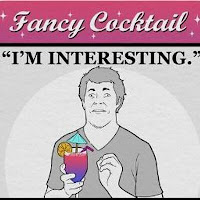Info-dumping is one of the biggest stumbling blocks in a first draft--especially if you're a pantser, and you're working out all the characters and settings as you go. Even if you've made careful, thorough character sketches ahead of time, you'll still discover new things about your characters as you write them. The same goes for your story world. If you're doing a good job of integrating your setting into your plot, you will find yourself exploring all manner of back alleys and sordid histories.
This is all part of the process, but some times the resulting text isn't terribly gripping for the reader, or is simply isn't necessary. Nobody enjoys reading long-winded blocks of characterization or exposition. Imagine if you met someone at a party and they immediately wrapped their arms around you and started whispering in your ear about their emotional problems. Or if you moved to a new apartment complex, and one of your neighbors cornered you and started spilling the last year's worth of gossip. It would be super awkward in real life, so why should it be acceptable in fiction?
Part of the problem is that info-dumps bring your story to a screeching halt so you can deliver a lecture (Like this quote? Click here to tweet it!). Nobody wants to pause a chase scene to consider some novel fact about the fruit stand the bad guy just crashed through. We want to get on with the show.
Furthermore, info-dumps are actually counter-productive. If you force feed your reader hulking blocks of information, they'll probably wind up tuning you out. Even if they don't, no reader is going to remember everything, so by the time a piece of backstory becomes relevant, they may have forgotten it.
The solution is to mete out your characterization and exposition in moderation. Give your readers only what they need, when they need it. In real life, we don't read a person's biography the day we meet them. We don't memorize maps and history books before we move to a new city. We just dive in head first and learn as we go. Make it the same way for your readers, and your book will start to feel real.
Characterization and exposition are yet another show and tell issue. Whenever possible, find a way to show us things about a character. Don't tell us the character is a lazy slob, show him tripping over a pile of dirty clothes while eating a slice of pizza that's been sitting out all night. Not only will the message come across clearer, but you will involve us in the story by inviting us to draw our own conclusions about this guy.
We're all guilty of overdoing things in first drafts. So how do you deal with it in editing?
First off, when you cut out long passages of characterization and exposition, don't simply delete them. They might contain insights you can use later. Keep all the parts you cut in a separate document. If you use character and setting sheets like mine, copy characterization into the relevant character sheet, and exposition into the relevant setting sheet. Long info-dumps aren't welcome in a story, but they make great notes that you can use to inform your decisions moving forward.
Look for any long, unbroken paragraphs. Anywhere you spend a lot of time in the narrative voice, you might be info-dumping. In general, I try to start a new paragraph every time there would be a camera cut if my story were a movie. Any time I see a long paragraph in my own work, chances are there's some info-dumping going on.
That won't always be the case, but it's a good rule of thumb to look for excessive characterization and exposition in passages of narrative. Dialogue and internal monologue will convey information about your characters, but they do so unobtrusively. In fact, dialogue and internal monologue are the best ways to get your characters across, so you don't really want to cut it unless it's just too much at once.
 |
| ...and if you're going to show people doing things, why not show them doing AWESOME things? |
There are no hard and fast rules on how to write characterization and exposition, or on how to cut them out when they're clogging up your story. The result you're going for is characters and settings that come to life without you ever conspicuously throwing the "on" switch. You don't want readers to know about your characters, you want them to feel their emotions. You don't need readers to pass a quiz on your setting's history, you want them to feel like they've lived there. So just toss your readers into the fray and let them sort it out. They can handle it in their real lives. Assume they're intelligent enough to handle it in your story.
























